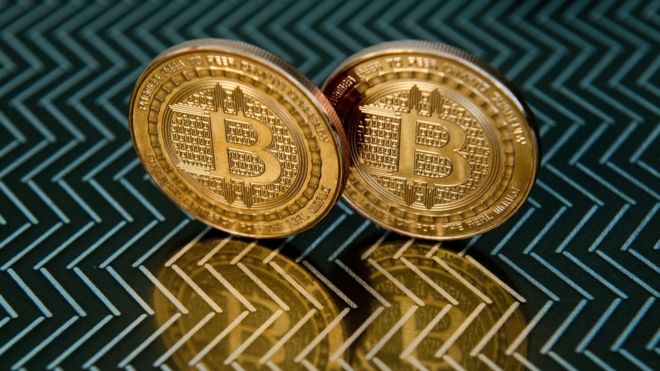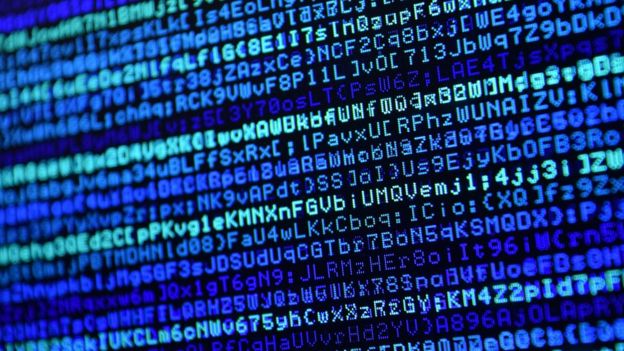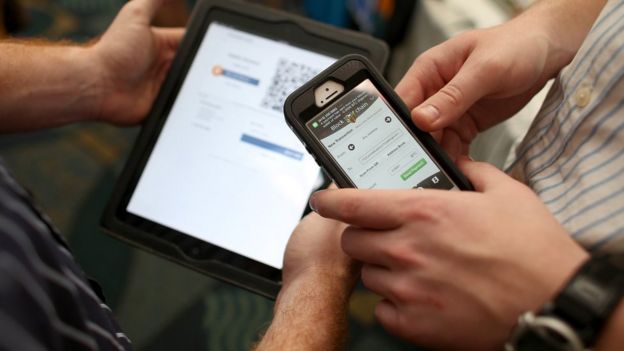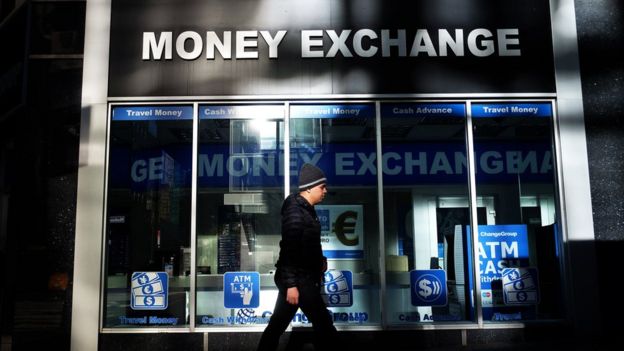Does Bitcoin still matter?
- 6 May 2016
- Technology
 Getty Images
Getty Images
Craig Wright's assertion that he was the creator of Bitcoin this week occurred at the same time as thousands of members of a growing industry tied to the virtual currency attended the Consensus 2016 conference in New York.
Attendees debated the truth of Wright's claims, but also grappled with the more poignant question of whether Bitcoin still matters?
Bitcoin has come a long way since its start. What was once marketed as a global currency - free from government restrictions - is now seen as a burgeoning technology that can help improve the world's financial system and change how information and assets are stored and shared.
Hundreds of new companies have started that focus on creating blockchains, the underlying ledger system on which Bitcoin is based.
 Thinkstock
ThinkstockBitcoin vs blockchain
The answer to Bitcoin's relevance depends on whether you are talking about the digital currency or the industry.
Because Bitcoin was the first digital currency, the sector as a whole is often referred to as the Bitcoin industry.
It now prefers to be called blockchain - after the technology which underpins Bitcoin.
The currency is struggling because of strains on its technology and persistent doubts about when and if it can become a mainstream form of money.
The blockchain industry however is thriving as new uses for the technology continue to be dreamed up and investors continue to fund them.
"Digital currency is now a misnomer for Bitcoin," says Erik Voorhees, chief executive officer for Shape Shift, a digital currency exchange. "It can be used as currency, but it can be used for many things."
 Getty Images
Getty ImagesWhat is blockchain?
Blockchains rely on cryptography to allow a set of computers to make changes to a global record without needing a central actor.
Removing the middleman cuts costs in almost every sector.
The blockchain is a ledger that records everything that happens to a collection of data known as a "block" in a chronological order or "chain".
As a currency this is an important feature because it allows users to be sure their digital money is one of a kind, the same way each note in your wallet is unique.
"Blockchain tech will be the way we create assets because it allows you to transfer digital information without copying," says Adam Ludwin, chief executive of Chain.com, which builds blockchain networks.
Blockchain can be used to track the history of all sorts of information and maintain its value, so, for example, doctors could use it to update medical records.
Since each change to a blockchain is made simultaneously across the whole network, no information is lost and because changes cannot be undone the system maintains its transparency. A special key is needed to make changes to each block, so individuals can keep their records safe by protecting that key.

Bitcoin problems
The original code for Bitcoin was designed to produce a fixed amount. Its popularity has meant the digital currency is coming to its limit faster than many expected.
Among Bitcoin's core engineers there is a division about how to fix this problem.
One group advocates doubling the size of the "blocks" in Bitcoin, something that could help, but may be short-term. Another group advocates rewriting its underlying protocols to have far more blocks - a solution that would make old Bitcoins incompatible with the new ones.
For companies that are thinking of using blockchain tech or digital currency, this schism makes it hard to choose Bitcoin.
"This is sending signals that are making engineers worried," says Jeff Garzik, one of Bitcoin's core developers. "People are waiting to see what happens before launching."
 Getty Images
Getty ImagesMore blockchains
Almost since Bitcoin's creation there have been copycats. As more industries warmed to the idea of blockchain these imitators began to look less like virtual currencies and more like digital record keepers.
Some of these are public - allowing anyone to join and grow the chain - while others are private to ensure only trusted parties have access, an approach favoured by banks.
This explosions of new blockchains has created a need for inter-ledger operators. These companies allow people to exchange digital assets from one blockchain to another.
"Blockchain is another database and it's impractical to think of the world working on one database," says Chris Larsen, the chief executive of global financial settlement company Ripple.
 Getty Images
Getty ImagesCould Bitcoin be a viable currency?
For believers in a government-free digital currency, Bitcoin is the still the biggest player.
Virtual currencies could still have a place in finance, particularly in countries with less stable governments and economies. Governments though have been looking for ways to add regulation, in an effort to prevent tax dodging, money laundering and other criminal activities that were associated with the early Bitcoin days.
Eventually blockchains could allow users to exchange the rights to all sorts of assets, like houses or stocks, update records and make payments without relying on a third party to verify the transaction.
But for this to become a reality more users will have to join blockchains.
比特幣的生死問題
2009年誕生的比特幣,被認為是實驗性質濃厚的加密電子貨幣,而其理念上的「去中央化、去管制」─這是一個沒有人管束、發行,全靠「礦工」在電腦上「挖礦」產生,各國政府、央行都管不著的貨幣,這點更是吸引不少烏托邦思想者。但這個「優點」卻也是其致命的缺點。沒有國家支持是缺陷
世界上所有能被廣泛接受、而能在所有國家間流通的貨幣,基本上都有一個負責發行的單位(大部份就是中央銀行)。央行能發行廣被接受與流通的貨幣,靠的則是背後國家力量保證此貨幣的流通、穩定其幣值,央行等於是一個保證最終支付的角色。而除了用作交易的流通功能外,貨幣另一個重要的功能是價值儲藏。
但這些功能,比特幣全部沒有─或是說即使有也是非常弱。全世界接受比特幣作為交易貨幣者幾稀,幾乎只限於特定科技網路領域;缺乏穩定幣值與最後支付者,讓比特幣的幣值起落極大,結果反過來又影響其扮演正常貨幣的角色。
1年暴漲100倍,缺乏貨幣該有的功能
例如2009年比特幣問世時,比特幣與美元的匯率是一美元可兌1309個比特幣,2013年初漲到一個比特幣兌10美元,接著拜中國炒家之賜,11月底飆到超過1200美元─超過了當時的金價,不到1年內就上漲100倍。接著再暴跌4成,一番起伏後去年1月跌到只有170元左右,到9-11月之間2個多月間又爆漲6成,現在回到400多美元。
這種起落無常的行情,與其說是「貨幣」,不如說是一個「炒作標的」。而且比特幣的「衰事」不斷;2014年全球最大的比特幣交易所Mt.Gox 宣告破產,接著又發生有交易所的比特幣被駭客洗劫一空。在比特幣最夯的時候,FED主席葉倫曾在國會表示,「我們無權監管比特幣」。這句話真正的含意應該是:出事也不干FED的事,別找我們哦。因此我們可看到美國的銀行、保險等金融機構出事,美國政府與FED非介入不可,但比特幣呢?死活自己顧吧!
核心成員:比特幣確實已死
比特幣核心開發團隊成員 Mike Hearn 今年初就曾經表態,由於比特幣相關的社群已經失敗,再加上比特幣的網路技術正處在崩潰的邊緣,比特幣的前景恐怕將是不甚樂觀。國際支付機構 TransferWise 總裁 Taavet Hinrikus 則說得更明確:「比特幣確實已死」;原因很簡單,現在市場上根本沒有人透過比特幣作電子商務交易(不論過去曾有多少電商宣稱接受比特幣作交易貨幣)。依照他的說法:「在真實世界裡,我們真的看不到有任何人在使用比特幣進行實體交易。」
就一個貨幣而言,這種情況確實就可判定死亡;至於比特幣仍瘋狂上漲或下跌等情況,則與貨幣功能無關,純是玩家仍懷抱希望的炒作。正如台灣央行2年前公布一份談比特幣的資料時,最後的結論是「比特幣不是貨幣,只是一種供作投資的貴金屬。」其實,情況再惡化可能較此更不堪─如果炒作無望、大家揚棄比特幣後,它連貴金屬都不是,只是「電腦中的一個數字」罷了。